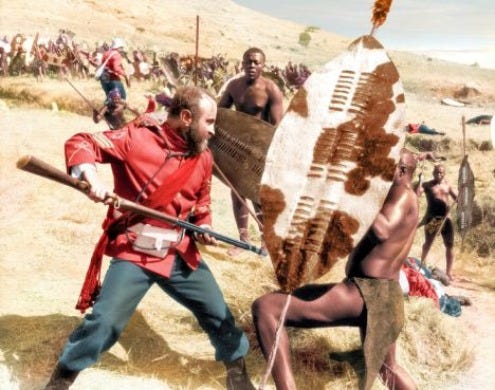Zulu Dawn (1979)

About a year and a half ago, I wrote about "Zulu," a 1964 movie that marked Michael Caine's film debut, while noting that it wasn't the one I remembered seeing as a child. That was "Zulu Dawn," a 1979 film about a different battle in the same Anglo-Zulu War, so I thought it was about time I caught up with it to see how it jibed with my memory.
"Zulu Dawn" is in essence a prequel, portraying the historic Battle of Isandlwana in 1879, while "Zulu" is about the smaller Battle of Rorke's Drift, which took place a few hours later on the same day.
If "Zulu" is a heroic tale about a small band of British soldiers repelling a horde of Zulus, then "Zulu Dawn" is a cautionary tale about a modern army being routed by a "primitive" army.
I was surprised by how much I remembered about the later film and how much I didn't. The key sequence that stayed with my young mind was the unctuous quartermaster (Peter Vaughan) refusing to dole out ammunition without proper procedure, making the men stand in line for bullets even as the battle lines have exhausted their supply and are being massacred by the Zulu impis, or warriors.
For me it encapsulated everything about the downside of the military mindset, which often puts rules and regulations above the very lives of the soldiers.
I'd also had a pretty clear memory for the battle scenes, with a lot of running to and fro and impaling with spears. The violence is a lot more graphic than "Zulu," but still subdued enough to earn a PG rating from the MPAA.
The Zulus take heavy losses but ultimately break the British lines and hand the English their first major defeat at the hands of a native army. The idea of warriors so freely sacrificing themselves to achieve victory seemed alien to me when I first saw it. In Western cinema and schools of thought, we are taught that the culture that embraces suicidal attacks is the inferior one since it places less value on human life.
Many other things about the movie had escaped my recollection. I didn't remember that Burt Lancaster starred in the picture, playing the one-armed Col. Durnford (well, he still had his left arm, but it was paralyzed and useless to him), a veteran cavalryman whose advice to the supremely confident commander, Lord Chelmsford (Peter O'Toole, whom I also didn't remember), is ignored, leading to catastrophe.
I had a vague notion of a gruff sergeant who commands his soldiers with an iron fist but also harbors deep affection for them but had no idea who Bob Hoskins was back then. It was one of his early film roles, and I can't believe he didn't make a deeper impression. Perhaps it's because this sort of character seems to exist in virtually every war movie.
Likewise, I didn't recognize Ronald Lacey as Norris Newman, a prominent British journalist who shadows Chelmsford and offers barely concealed criticism of him, his motivations for starting this war and the way he is conducting it. Of course, it would be two more years before Lacey became cult-famous for playing the piggish Nazi villain Toht in "Raiders of the Lost Ark."
As with "Zulu," I was again impressed that the Zulu were not portrayed as savage brutes but clever warriors. Indeed, it is the overriding historical opinion that Chelmsford and his commanders were completely out-strategized by their Zulu counterparts. Chelmsford even refused to entrench his camps by laagering his wagons, or encircling them into a defensive unit.
The two "Zulu" movies are tied together by the contributions of Cy Endfield, who co-wrote both movies and directed the first one. Alas, Douglas Hickox doesn't prove as skilled behind the camera in "Zulu Dawn," which comes across as a simple two-act play: Prelude to war, and the war. The former is concerned with a lot of British derring-do and priggish behavior. The latter is the real movie — battle scenes with a lot of kinetic energy but not as much emotional punch as they should have.
3.5 Yaps



